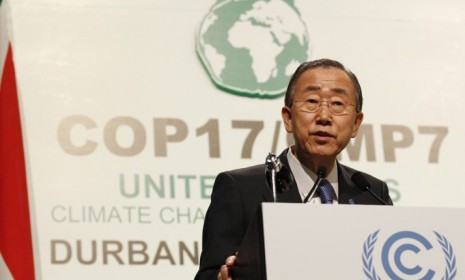The U.N.'s last-minute climate deal: 'Pitiful'?
After several days of tense negotiations in South Africa, Ban Ki-moon and Co. avoid going home empty-handed. But what did they really accomplish?

A free daily email with the biggest news stories of the day – and the best features from TheWeek.com
You are now subscribed
Your newsletter sign-up was successful
After three sleepless nights, delegates at a United Nations climate conference in Durban, South Africa, reached a last-minute compromise on Sunday. Among other things, they finalized an agreement, spelled out at a meeting last year, to create a fund transferring billions of dollars from rich countries to poor ones. That money will help poor countries make the switch to cleaner energy sources. But the negotiators failed to establish strict new targets to limit global warming. Does that make the deal a failure?
This compromise accomplishes nothing: How "pitiful," says Damian Carrington at Britain's Guardian. For years, we've needed a global plan to "tackle climate change." But all we really got out of Durban was a squishy commitment to devising a strategy by 2015 and implementing it by 2020. That delay "ensures beyond doubt that our children will be worse off than we have been," because they face an environmental challenge that makes Europe's financial problems look like peanuts.
"Climate deal: A guarantee our children will be worse off than us"
The Week
Escape your echo chamber. Get the facts behind the news, plus analysis from multiple perspectives.

Sign up for The Week's Free Newsletters
From our morning news briefing to a weekly Good News Newsletter, get the best of The Week delivered directly to your inbox.
From our morning news briefing to a weekly Good News Newsletter, get the best of The Week delivered directly to your inbox.
Actually, the deal exceeded expectations: "With many governments distracted by pressing economic worries," we're lucky to get any deal at all, says The Economist. In addition to the new fund, European nations agreed to continue cutting emissions under the Kyoto Protocol, which was set to expire next year. In exchange, China, India, and other developing nations that had "no emissions-cutting burden" under Kyoto have agreed to share the pain under the next treaty, which should kick in by 2020. That's not a solution, but it's a start.
Global summits won't solve our climate problem: As usual, the climate diplomats "fudged" or "punted" the important issues, says Bryan Walsh at TIME. Sure, they managed to "stave off the total collapse of the U.N. climate process." But the truth is, our global league of nations won't be the hero that saves our planet, "if it's to be saved at all. The hard work will be done elsewhere: In national legislatures, in statehouses, in laboratories, and inside each person." The question is, are we up to the task?
"U.N. global-warming talks: Good for diplomats, indifferent for the climate"
A free daily email with the biggest news stories of the day – and the best features from TheWeek.com